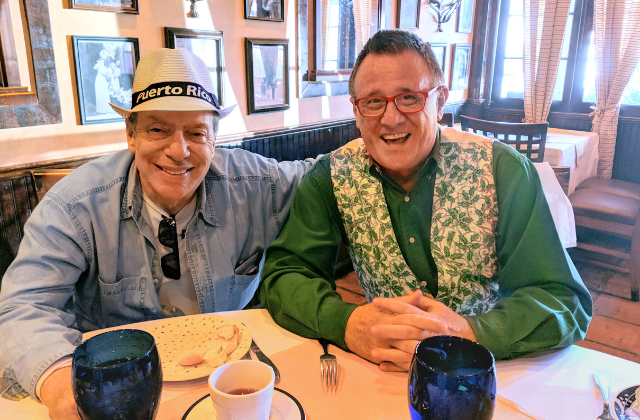
The necessity of newspapers as SFGN turns 12
by Pier Angelo
(Pier Angelo was born in Italy, moved to England at the age of 17, and learned English at the Nelson School of English. He attended college and graduate school in Manhattan. In 2009, he founded SFGN — South Florida Gay News — with Norm Kent. The following column appeared in the June 14, 2022, edition of the newspaper, and it appears here with permission.)

How did it all start? In the late summer of 2009 I had some legal matters to discuss with my attorney, Norm Kent.
That day, in his office, he told me he was considering starting a gay newspaper. I have always been militant and the idea appealed to me. According to him he needed four partners. I offered to be one of the four.
I soon found out I was the only sucker in town who had taken the bait. But I was still intrigued. We agreed to be 50/50 partners and took a huge leap of faith. The first issue came out January 25, 2010, and the rest is history.
I have now retired, but I still contribute a column once in a while. It is still a thrill seeing this newspaper grow and survive as a credible, respected, voice of the community. This is due to the hard work and dedication of Norm Kent, Jason Parsley, Justin Wyse and the support of loyal advertisers and readers.
The same way video killed the radio star, the internet, readers’ apathy and economics are killing newsprint. Americans spend over 250 hours a month watching TV and surfing the web. Newspapers are no longer the predominant go-to news source; the internet overtook newspapers as a news outlet a few years ago. Your browser, or a host of apps, can in fact replace print news. (But thanks for picking up this publication.)
The irreplaceable role of newspapers, to dissect, stimulate, expose, organize and analyze the public debate, is threatened by a free for all chaos. Some of the largest websites are aggregate news sites, meaning they simply pull news from other sources.
Newspapers all over the world are suffering, or closing, and reporters are dwindling through downsizing. Who will dig up corruption, white-collar crimes, exploitation, abuse of minorities, political scandals, and big business cover-ups when there are no more reporters?
Who will listen to whistleblowers and question authority? Fact-finding has been replaced by the hearsay of a blogger with a grudge. Editorials can stimulate thinking and generate proposals for progress, change and reforms. The founding fathers recognized that journalism is an essential component of the marketplace of ideas.
Politicians, business leaders, the church, and now even terrorists, resent being exposed and would not mind seeing the newspapers go the way of long-playing records. Napoleon once said, “I fear the newspapers more than a hundred thousand bayonets.” Nowadays terrorists react to lines drawn on paper with pencils. On January 7, 2015, Islamic “extremists” stormed the Paris offices of a satirical newspaper killing 12 people. Al Qaeda repeatedly threatened “Charlie Hebdo” for publishing caricatures of the Prophet Muhammad, among other controversial sketches, calling them blasphemous, but at the same time ignoring the real pornography of how their religion treats women and gays.
Newspapers are the watchdogs for the public interest. There is a saying in Latin that goes: “Quis Custodiet Ipsos Custodes?” — “Who Will Guard The Guards Themselves?” With the cacophony coming out of thousands of bloggers, or flimsy social media outlets, good critics and good reporters are an endangered species. Everybody is a blogger or a tweeter and nobody reads anything of substance anymore. In the UK, the Commission of Inquiry into the Future of Civil Society has branded the majority of online news as little more than “recycled ‘churnalism.'”
The preservation of this invaluable freedom of expression tool has been successfully demonstrated in the European Union where governments have extended media support to all daily publications — regardless of the newspapers’ political affiliations. While we take for granted all of our publications, gay rights activists in Uganda risked, years ago, detention, violence and death threats for launching an LGBT magazine called Bombastic. Their aim is to “share the realities of being gay in Uganda.”
You can pick up SFGN, or any other gay newspaper, all around town, without fear.
In this country many think that reading and supporting a newspaper is a thing of the past.
SFGN continues to prove that it’s still doable. It has featured international, national and local news, entertainment and theater reviews, editorial columns, breaking stories, exposed crooks and injustice, and made you part of all this by allowing your comments to be read by all as if they were an open forum. So happy 12th anniversary.
In the age of fake news and alternative facts, SFGN believes in what John Stuart Mill said, “If we silence an opinion, we may silence the truth.” Otherwise the landscape of America will soon resemble the 2007 movie “Idiocracy”: a sarcastic comedy film where an average guy wakes up 500 years later and finds that everything has been dumbed down to the point that he is the smartest guy on the planet. Without doubt an uninformed and ignorant society is easy prey for dictatorship.
“Were it left to me to decide whether we should have a government without newspapers, or newspapers without a government, I should not hesitate a moment to prefer the latter” — Thomas Jefferson, 1787.
GUEST COMMENTARY
Volume 24
Issue 5








